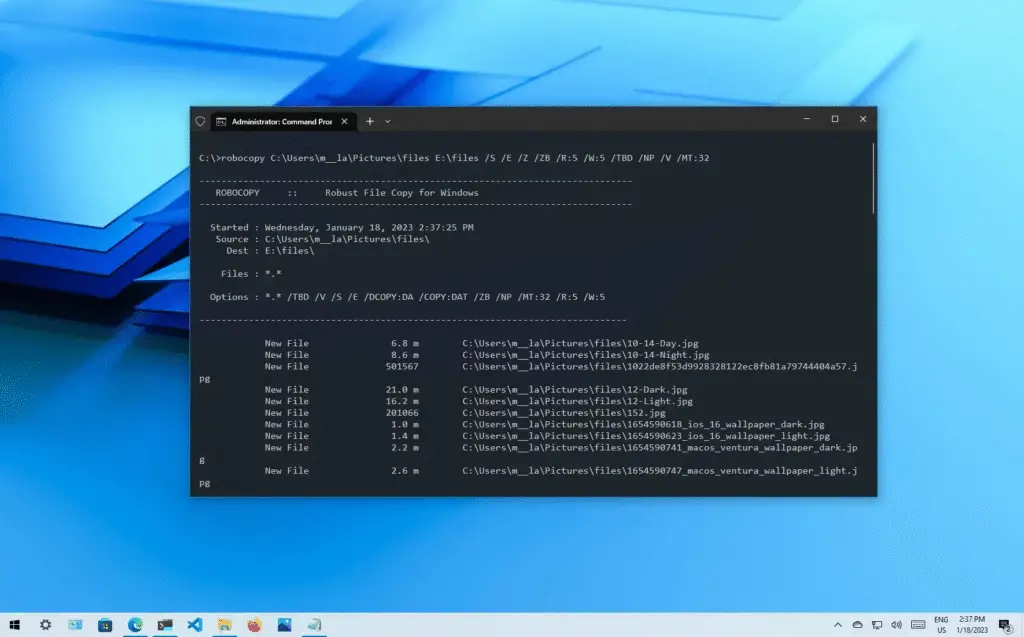Contents
- 1 What /MT robocopy multithread actually does
- 2 Quick-start recipes (copy & tweak)
- 3 How many threads should I use?
- 4 Performance switches that matter
- 5 What to avoid / common pitfalls
- 6 Verifying success (exit codes)
- 7 Logging & monitoring
- 8 Review: When Robocopy (/MT) is the right tool
- 9 Handy cheatsheet
- 10 Further reading (solid, up-to-date sources)
What /MT robocopy multithread actually does
Robocopy can copy multiple files at once using a thread pool. You control the pool size with /MT:n where n = 1–128 (default is 8 if you don’t specify a number). Microsoft notes that multithreading improves throughput and recommends redirecting output to a log for best performance; /MT is incompatible with /IPG and /EFSRAW.

Quick-start recipes (copy & tweak)
1) Fast local or LAN folder sync (keeps permissions & times)
robocopy "D:\Source" "\\Server\Share\Dest" /MIR /COPY:DATSO /DCOPY:DAT /MT:32 /R:5 /W:3 /XJ /NFL /NDL /NP /LOG:C:\logs\job1.log
/MIRmirrors (add + delete). Use with care./COPY:DATSO= Data, Attributes, Timestamps, Security (ACLs), Owner./DCOPY:DATpreserves dir attributes & times./XJskips junctions/symlinks (avoids loops)./NFL /NDL /NPtrims console spam; logging helps speed with /MT.
2) Lots of huge files (VMs, ISOs)
robocopy "E:\VMs" "\\NAS\VMs" *.vhdx *.iso /E /J /MT:16 /R:3 /W:2 /TEE /LOG+:C:\logs\vm_copy.log
/J= unbuffered I/O (often faster for big files).
3) Millions of tiny files (code, photos)
robocopy "D:\Photos" "Z:\Photos" /E /MT:64 /R:2 /W:1 /FFT /XJ /NP /LOG:C:\logs\photos.log
- High
/MThelps small-file workloads;/FFTrelaxes timestamp granularity for cross-platform shares. (General /MT behavior & limits: MS docs.)
4) “Resumeable” copy across flaky links
robocopy "C:\Data" "\\Remote\Backup" /E /ZB /MT:16 /R:5 /W:5 /LOG:C:\logs\resume.log
/ZBuses restartable mode, falling back to backup mode if needed. (Tip:/Zcan slow some links; tune case by case.)
5) Throttle (don’t saturate the pipe)
- You can’t use
/IPGwith/MT. If you must throttle, drop/MTor rate-limit at the network layer/QoS.

How many threads should I use?
- Start at 16–32 for most LAN jobs; 64–96 can help with mountains of small files. Going past that can cause diminishing returns or contention on slow storage/NAS CPUs. (Default 8; allowed 1–128.)
Performance switches that matter
- /MT:n — thread count (default 8; max 128).
- /J — unbuffered I/O; great for very large files.
- /NOOFFLOAD — disable Windows copy offload (use if your storage offload behaves poorly).
- /R:n /W:n — lower retries/waits (defaults are huge; set like
/R:5 /W:3). - /LOG[:file] — redirect output; recommended with /MT for speed and clean logs.

What to avoid / common pitfalls
- Using
/IPGwith/MT(not supported). - Mindless
/MIRon the wrong path—deletes at destination. Dry-run first with/L. (General guidance.) - Huge
/R&/Wdefaults; they can stall jobs for hours on one bad file. Tune them. - Expecting linear speedup with threads; disk/NAS/CPU and SMB limits cap gains. (Empirical testing shows diminishing returns.)
- Console spam hurting speed with /MT; use
/LOG+/NFL /NDL /NP.
Verifying success (exit codes)
Robocopy’s exit code is a bitmask (0–7 = success states; ≥8 indicates failure). Many tools treat “non-zero = error”, which is wrong for Robocopy. Adjust your scripts accordingly.
Example batch snippet:
robocopy "C:\A" "D:\B" /E /MT:32
set RC=%ERRORLEVEL%
if %RC% GEQ 8 (
echo Robocopy failed with code %RC%
exit /b %RC%
) else (
echo Robocopy completed (code %RC%)
)
Logging & monitoring
- Use
/LOG:c:\logs\job.logor/LOG+to append; pair with/TEEto also echo to screen. (Logging improves /MT performance, per docs.)
Review: When Robocopy (/MT) is the right tool
Pros
- Rich flags for ACLs, timestamps, mirroring, retries, resume, logs.
- Built-in, scriptable, fast for big trees (especially small files) thanks to
/MT.
Cons
- No native bandwidth cap with
/MT(since/IPGconflicts). - Diminishing returns at high thread counts; can overwhelm slow NAS/SMB links. (Empirical tests.)
- Syntax quirks; exit code bitmask confuses CI/backup wrappers.
Good alternatives
- For one-shot local copies of very large files: plain Explorer or
Copy-Item -ToSession(PowerShell Remoting) sometimes ties. - For scheduled backups with versioning: use backup software; Robocopy doesn’t version files.
- For WAN/Cloud: use tools that handle latency/compression/delta-sync.
Handy cheatsheet
- Mirror + ACLs (safe-ish defaults)
/MIR /COPY:DATSO /DCOPY:DAT /R:5 /W:3 /XJ /MT:32 /LOG:job.log - Big files
/E /J /MT:16 /R:3 /W:2 /LOG:big.log - Many tiny files
/E /MT:64 /NFL /NDL /NP /LOG:tiny.log - Dry-run
... /L /UNILOG:c:\logs\whatwouldhappen.log(no changes; show actions)
Further reading (solid, up-to-date sources)
- Microsoft Learn: full Robocopy reference and
/MTcaveats (defaults, incompatibilities, logging tip). - PDQ’s “Hitchhiker’s Guide”: modern switch coverage with examples.
- Petri’s “Complete Guide to Robocopy” (updated 2025): broader overview & scenarios.
- SS64 exit codes table (indicates 0–7 = success).
- Benchmarks & thread scaling discussion (why more threads ≠ always faster).
FAQs
What does /MT do in Robocopy?
It enables multithreaded copying, allowing Robocopy to copy multiple files simultaneously instead of one at a time. This can dramatically increase speed—especially when copying many small files.
What’s the default number of threads?
/MT defaults to 8 threads if you don’t specify a number. You can set /MT:n where n ranges from 1 to 128.
Is /MT available on all Windows versions?
/MT was introduced in Windows 7 / Server 2008 R2 and is available in all newer versions of Windows (10, 11, Server 2012+).
How many threads should I use?
8–16 threads → Good default for most jobs.
32–64 threads → Best for lots of small files.
16–32 threads → Best for large files or network drives.
Higher isn’t always better — performance can drop if disk or network can’t keep up.
Does /MT make copying over networks faster?
Usually yes, but only if the source/destination drives and network bandwidth can handle parallel transfers.
Can I use /MT with /IPG (inter-packet gap)?
No. /IPG (which throttles network traffic) is incompatible with /MT.
Can I use /MT with /EFSRAW?
No. Multithreading doesn’t work with encrypted file system raw copies.
READ ALSO: How to turn off hardware acceleration chrome?
